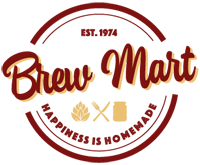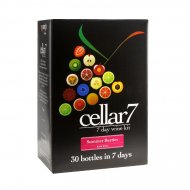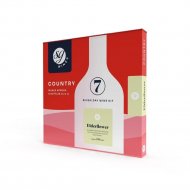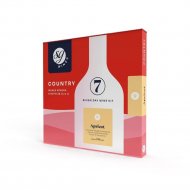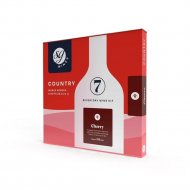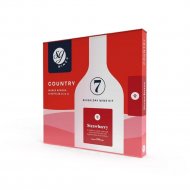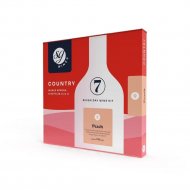Sign up to the Brew Mart newsletter for the latest news, offers & more

Fruit Wine Making Kits
Homebrew fruit wines have traditionally been popular with home winemakers in areas with cold climates.
What are country / fruit wines?
The term "country wine" is most commonly used in home brewing. It is a catch-all term for a homemade wine produced with naturally-sourced produce rather than a commercially produced wine with commercially sourced produce.
Country wines are wines made from produce typically associated with the countryside. The most popular Country wines are fruit wines, as fruits have high sugar content. Although fruit wines are more popular, country wines are not limited to fruit.
You can make wines from flowers, tree sap, leaves, and grains, essentially anything that contains sugar that you can convert to sugar or add sugar to. Our mantra is, "If you can think of it, you can do it." and if it's a wine yeast you're adding, it will probably come under the heading of country wine.
Many beginners keep it simple when starting with country wines using one fruit or flower or whatever product captures their imagination. We believe this is a perfect place to start for a few reasons.
1. It keeps the process simple.
2. It helps beginners develop the foundations of a flavour palette.
3. Keeping it simple makes understanding what happens to flavours, etc., easier during production and fermentation.
4. Homebrew fruit wines with one flavour are easier to blend and adapt, which helps beginners develop recipes to how they like it.
If, however, you are interested in doing something a bit more adventurous, there are many classic combinations. Here are some of our favourites;
- Apple and Blackcurrant wine
- Apple and elderflower wine
- Rhubarb and Ginger wine
- Cinnamon and Honey wine (Mead)
- Strawberry and Mint wine
There is a myriad of wonderful flavour combinations that you can do, much more than we could put in one article. So if you have any queries about blending flavours, please come and talk to us. We are always willing to help.
It is almost impossible not to talk about grapes simultaneously when talking about wine. Grapes are understandably one of the best fruits for winemaking. Many recipes suggest using grapes in some form or another, even if it is not the principal flavour of the wine produced. Raisins, sultanas and grape juice have been in many recipes over the years.
Research in Canada has found that the higher the concentration of grape juice, the more stable it is during transit. It is also cheaper to transport. This research has resulted in grape concentrate widely replacing raisins and the like because grape concentrate is easier to use, more affordable, and produces consistently better results.
Making country wine is tremendous fun and can be made throughout the year. However, harvest time, late Summer early Autumn, is probably the best time. At this time of year, there is the widest selection of fresh fruits available. Other notable times are late winter for Rhubarb, early spring for birch sap and mid to late spring for elderflower.
Like most alcoholic drinks, country wines improve with age. Typically they take between 6 to 18 months to mature, but it is well worth the wait! One of the beauties of country wine is that every batch of wine you make will have a distinctive personality.
In the warmer climates such as Africa, India, and the Philippines, wine is also made from bananas.
Fruit wine making kits are produced from virtually any plant matter that can be fermented.
Home brew Fruit wines are made from a variety of base ingredients (other than grapes) there is a wide variety of flavours taken from fruits, flowers, and herbs.
Fruit wines are usually defined as by their main ingredient (e.g., elderberry fruit wine or strawberry fruit wine) because the general reference to wine states that it is made from fermented grape juice.
In Britain, home brew fruit wine is mainly called country wine; the term should not be confused with the French name Vin de pays, which is grape wine.
Most fruits and berries have the characteristics to produce a fruit wine. There are many ways of extracting juice and flavour from the fruits or plants being used.
Stewing, pressing the juice, and fermenting the pulp of the fruits are popular methods. Few ingredients other than grapes have the equivalent quantities of sugar, tannin, acid, water and nutritive salts for yeast feeding to produce a drinkable stable fruit wine naturally; Consequently, most fruit wine is altered in one or more respects at the stage of fermentation.
However, some of these home brew fruit wines do require the addition of honey or sugar to make them drinkable and also to increase the alcoholic content (sugar is converted to alcohol in the process of fermentation).
- Click here to see How to make wine at home
- Click here to see Common problem with wine making
- Click here for recipes for country wines
